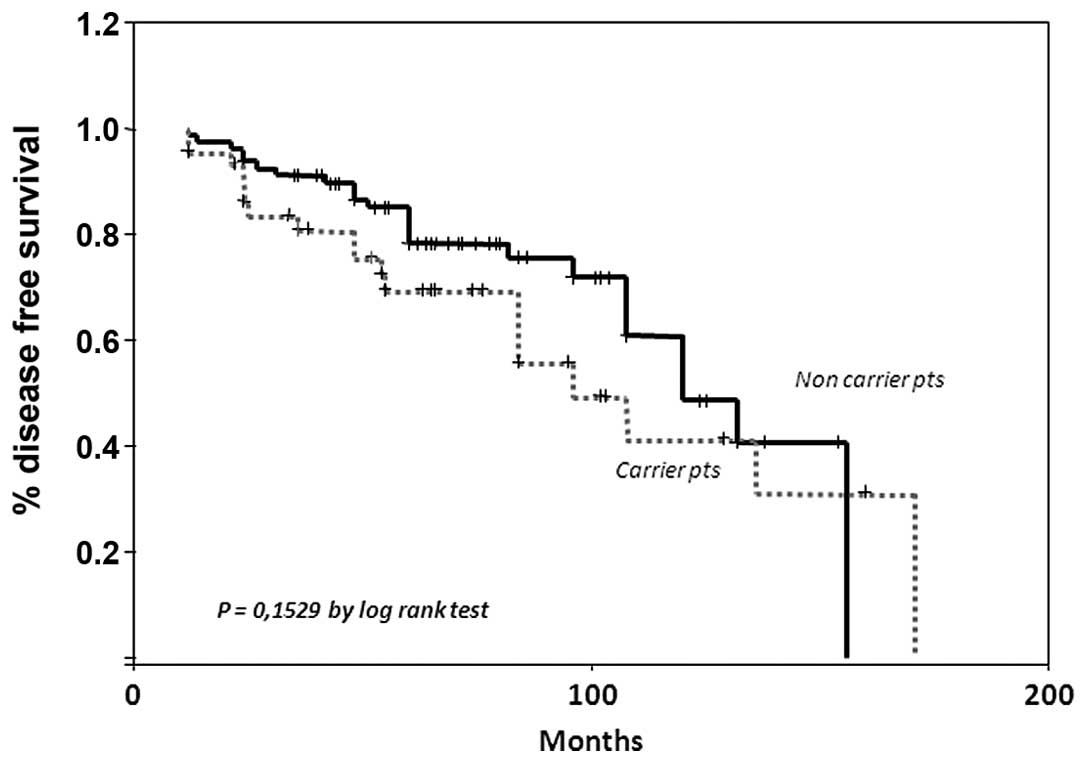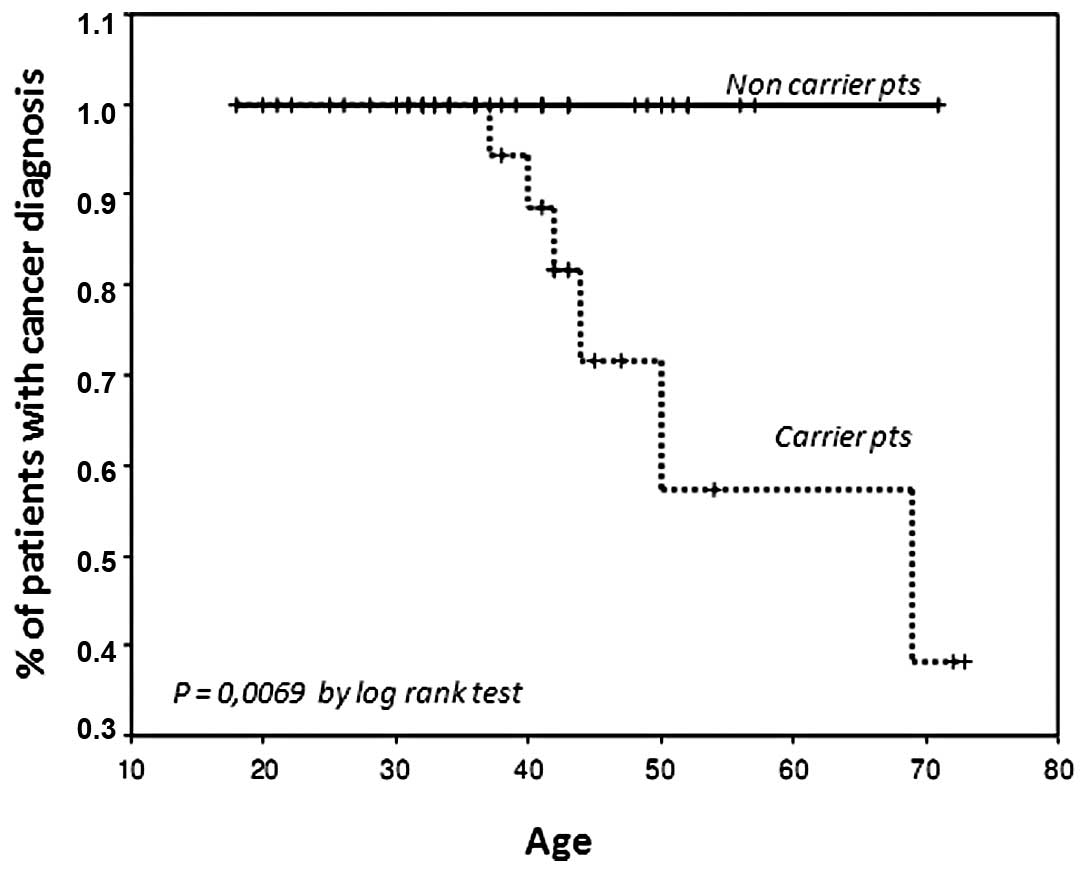|
1
|
Emery J, Lucassen A and Murphy M: Common
hereditary cancers and implications for primary care. Lancet.
358:56–63. 2001. View Article : Google Scholar : PubMed/NCBI
|
|
2
|
Brose MS, Rebbeck TR, Calzone KA, et al:
Cancer risk estimates for BRCA1 mutation carriers identified in a
risk evaluation program. J Natl Cancer Inst. 94:1365–1372. 2002.
View Article : Google Scholar : PubMed/NCBI
|
|
3
|
Easton DF, Bishop DT, Ford D and Crockford
GP: Genetic linkage analysis in familial breast and ovarian cancer:
results from 214 families. The Breast Cancer Linkage Consortium. Am
J Hum Genet. 52:678–701. 1993.PubMed/NCBI
|
|
4
|
King MC, Marks JH and Mandell JB; New York
Breast Cancer Study Group. Breast and ovarian cancer risks due to
inherited mutations in BRCA1 and BRCA2. Science. 302:643–646. 2003.
View Article : Google Scholar : PubMed/NCBI
|
|
5
|
Antoniou A, Pharoah PD, Narod S, et al:
Average risks of breast and ovarian cancer associated with BRCA1 or
BRCA2 mutations detected in case series unselected for family
history: a combined analysis of 22 studies. Am J Hum Genet.
72:1117–1130. 2003. View
Article : Google Scholar
|
|
6
|
Cancer risks in BRCA2 mutation carriers.
The Breast Cancer Linkage Consortium. J Natl Cancer Inst.
91:1310–1316. 1999. View Article : Google Scholar : PubMed/NCBI
|
|
7
|
Liede A, Karlan BY and Narod SA: Cancer
risks for male carriers of germline mutations in BRCA1 or BRCA2: a
review of the literature. J Clin Oncol. 22:735–742. 2004.
View Article : Google Scholar : PubMed/NCBI
|
|
8
|
Metcalfe K, Lubinski J, Lynch HT, et al:
Family history of cancer and cancer risk in women with BRCA1 or
BRCA2 mutations. J Natl Cancer Inst. 102:1874–1878. 2010.
View Article : Google Scholar : PubMed/NCBI
|
|
9
|
Lee EH, Park SK, Park B, et al: Effect of
BRCA1/2 mutation on short-term and long-term breast cancer
survival: a systematic review and meta-analysis. Breast Cancer Res
Treat. 122:11–25. 2010.
|
|
10
|
Adem C, Reynolds C, Soderberg CL, et al:
Pathologic characteristics of breast parenchyma in patients with
hereditary breast carcinoma, including BRCA1 and BRCA2 mutation
carriers. Cancer. 97:1–11. 2003. View Article : Google Scholar : PubMed/NCBI
|
|
11
|
Chappuis PO, Nethercot V and Foules WD:
Clinico-pathological characteristics of BRCA1 and BRCA2-related
breast cancer. Semin Surg Oncol. 18:287–295. 2000. View Article : Google Scholar : PubMed/NCBI
|
|
12
|
Pathology of familial breast cancer:
differences between breast cancers in carriers of BRCA1 or BRCA2
mutations and sporadic cases. The Breast Cancer Linkage Consortium.
Lancet. 349:1505–1510. 1997. View Article : Google Scholar : PubMed/NCBI
|
|
13
|
Rennert G, Bisland-Naggan S,
Barnett-Griness O, et al: Clinical outcomes of breast cancer in
carriers of BRCA1 and BRCA2 mutations. N Engl J Med. 357:115–123.
2007. View Article : Google Scholar : PubMed/NCBI
|
|
14
|
Budroni M, Cesaraccio R, Coviello V, et
al: Role of BRCA2 mutation status on overall survival among breast
cancer patients from Sardinia. BMC Cancer. 9:622009. View Article : Google Scholar : PubMed/NCBI
|
|
15
|
Verhoog LC, Brekelmans CT, Seynaejjve, et
al: Contralateral breast cancer risk is influenced by the age at
onset in BRCA1-associated breast cancer. Br J Cancer. 83:384–386.
2000. View Article : Google Scholar : PubMed/NCBI
|
|
16
|
Metcalfe K, Lynch HT, Ghadirian P, et al:
Contralateral breast cancer in BRCA1 and BRCA2 mutation carriers. J
Clin Oncol. 22:2328–2335. 2004. View Article : Google Scholar : PubMed/NCBI
|
|
17
|
Pierce LJ, Levin AM, Rebbeck TR, et al:
Ten-year multi-institutional results of breast-conserving surgery
and radiotherapy in BRCA1/2-associated stage I/II breast cancer. J
Clin Oncol. 24:2437–2443. 2006.PubMed/NCBI
|
|
18
|
Sariego J: The impact of facility
volume/size on breast cancer treatment and outcome. Am Surg.
76:1333–1337. 2010.PubMed/NCBI
|
|
19
|
Paradiso A, Giardina C and Meyer JS:
Statewide study of diagnostic agreement in breast pathology. J Natl
Cancer Inst. 91:1076–1077. 1999. View Article : Google Scholar : PubMed/NCBI
|
|
20
|
Early Breast Cancer Trialists’
Collaborative Group (EBCTCG). Peto R, Davies C, Godwin J, et al:
Comparisons between different polychemotherapy regimens for early
breast cancer: meta-analyses of long-term outcome among 100,000
women in 123 randomised trials. Lancet. 379:432–444. 2012.
View Article : Google Scholar
|
|
21
|
Tommasi S, Crapolicchio A, Lacalamita R,
et al: BRCA1 mutations and polymorphisms in a hospital-based
consecutive series of breast cancer patients from Apulia, Italy.
Mutat Res. 578:395–405. 2005. View Article : Google Scholar : PubMed/NCBI
|
|
22
|
Tommasi S, Pilato B, Pinto R, et al:
Molecular and in silico analysis of BRCA1 and BRCA2 variants. Mutat
Res. 644:64–70. 2008. View Article : Google Scholar : PubMed/NCBI
|
|
23
|
Mueller CR, Kristoffersson U and
Stoppa-Lyonnet D: External quality assessment for mutation
detection in the BRCA1 and BRCA2 genes: EMQN’s experience of 3
years. Ann Oncol. 15(Suppl 1): i14–i17. 2004.PubMed/NCBI
|
|
24
|
Lawless JS: Statistical Models and Methods
for Lifetime Data. John Wiley and Sons; New York, NY: 1982
|
|
25
|
Cox DR: Regression models and life tables.
JR Stat Soc. 34:187–220. 1972.
|
|
26
|
Sweet SA: Data Analysis with SPSS. Allyn
and Bacon; Boston, MA: 1998
|
|
27
|
Robson M, Chappuis PO, Satagopan J, et al:
A combined analysis of outcome following breast cancer: differences
in survival based on BRCA1/BRCA2 mutation status and administration
of adjuvant treatment. Breast Cancer Res. 6:R8–R17. 2004.
View Article : Google Scholar : PubMed/NCBI
|
|
28
|
Kirova YM, Stoppa-Lyonnet D, Savignoni A,
et al: Risk of breast cancer recurrence and contralateral breast
cancer in relation to BRCA1 and BRCA2 mutation status following
breast-conserving surgery and radiotherapy. Eur J Cancer.
41:2304–2311. 2005. View Article : Google Scholar : PubMed/NCBI
|
|
29
|
Brekelmans CTM, Tilanus-Linthorst MMA,
Seynaeve C, et al: Tumor characteristics, survival and prognostic
factors of hereditary breast cancer from BRCA2-, BRCA1- and
non-BRCA1/2 families as compared to sporadic breast cancer cases.
Eur J Cancer. 43:867–876. 2007. View Article : Google Scholar : PubMed/NCBI
|
|
30
|
Delaloge S, Kloos I, Ariane D, et al:
Young age is the major predictor of local relapse among
conservatively treated BRCA1-, BRCA2-, or non BRCA-linked
hereditary breast cancer (BC). Proc Am Soc Clin Oncol.
22:412003.
|

















